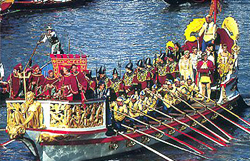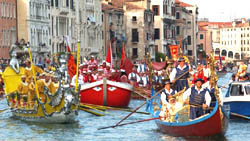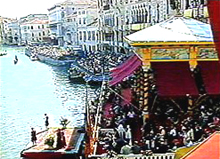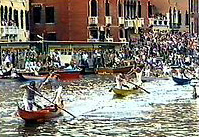|

The historical procession
This procession is a re-evocation of the welcome given to
Caterina Cornaro, wife of the King of Cyprus, in 1489 after she renounced
her throne in favour of Venice.
It is a procession of 16th century style boats, with the famous Bucintoro,
the boat representing the Serenissima, at its head.

This is followed by dozens of multi-coloured boats with gondoliers
in period costume carrying the Doge and his wife, along with Caterina
Cornaro, and the highest dignitaries from the Venetian Magistracy,
faithfully reconstructing an event from the glorious past of the Marine
Republic’s, one of the most powerful and influential in the
Mediterranean. |

The public spectacle Crowded along the banks, or in the
floating stands, or even better in one of the boats moored along
the Canal, the spectators participate with gusto and shouts of encouragement
during the sporting events.
 As
the multi-coloured boats speed past thousands of spectators, crowded
along the banks, or in the floating stands, or even better in one
of the boats moored along the Canal, an incessant babble acts as
the soundtrack to the competition, which has continued for a thousand
years and is a perpetual reminder of Venice’s close relationship
with water, the element showing continuity between the past, present
and future of the lagoon city. As
the multi-coloured boats speed past thousands of spectators, crowded
along the banks, or in the floating stands, or even better in one
of the boats moored along the Canal, an incessant babble acts as
the soundtrack to the competition, which has continued for a thousand
years and is a perpetual reminder of Venice’s close relationship
with water, the element showing continuity between the past, present
and future of the lagoon city.
|
Crucial points
The traditional reference points of the regatta are:
- the spagheto or cordin, the rope stretched
across the starting point in front of the Public Gardens;
- the paleto, a pole driven into the centre of the Grand
Canal in front of the Church of Sant’Andrea della Zirada,
around which the boats must tum before going back up the course
(the first boats round the paleto are traditionally those which
take the pennants awarded to the winners);
- the machina, a construction erected on a richly carved,
painted and gilded wooden raft, which marks the finish of the
race and on which the prize-giving ceremonies are held.
|
|